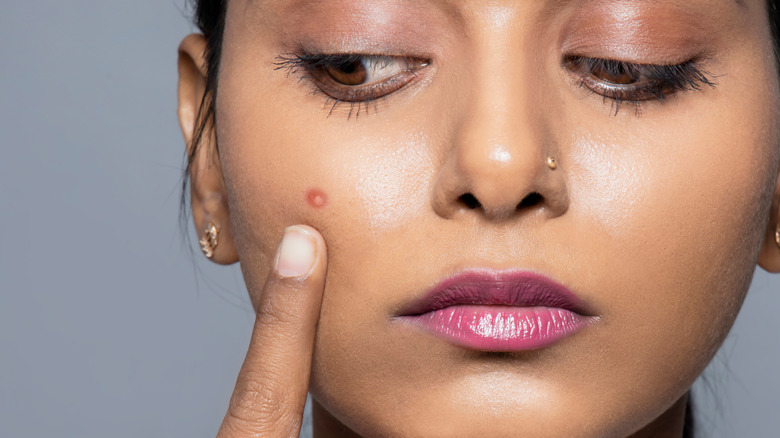Boil Versus Pimple: What's The Difference?
Few things can cause the same instant distress as a skin blemish. You may be having a perfectly fine day, and then suddenly notice a huge zit on your forehead or your shoulder. Immediately, you're faced with the dilemma of how to deal with it. You could leave it alone and try to cover it with makeup, but that might make it worse. Or you could get rid of it and start the healing process, but that leaves you with a red, swollen wound in the meantime. These seemingly simple options have consequences, no matter which decision you make.
As it turns out, however, your choices might not be so cut and dry. What you may think of as a pimple could in fact be a boil. Like pimples, boils are infections on the surface of the skin. Boils are incredibly common, as are pimples (via MedlinePlus). And in the beginning, they may even look the same. The similarities between the two end there, though.
Nearly everything else about the two is different, from their causes to the ways they develop to their treatment plans. The trick is to know how to tell them apart early enough to render the right treatment.
Signs, symptoms, and infection sources
The government health website of New South Wales describes a boil (also called a furuncle) as an infection of a hair follicle and the skin around it. Over time, this infection can grow up to 2 inches or 5 centimeters as it fills with pus. If left untreated, boils can grow in clusters known as carbuncles (via the Mayo Clinic). MedlinePlus describes them as either reddish or purple (depending on skin tone) and sensitive or tender to the touch. Gradually, it may come to resemble a small water balloon that occasionally weeps, clearly setting them apart from regular acne.
Though boils may start out similar in appearance to acne, their rapid change is likely due to their root cause. MedlinePlus explains that boils are caused by Staphylococcus aureus, more commonly known as a staph infection. This is why they can spread to other parts of the body and from one person to another through touch. It is also why experts say you should never pop or cut open a boil, as doing so can spread the infection. Instead, use a warm wet compress several times a day to encourage the boil to weep on its own and to keep it clean. If it doesn't clear up on its own in a few weeks — or if it recurs — doctors may prescribe antibiotics.


